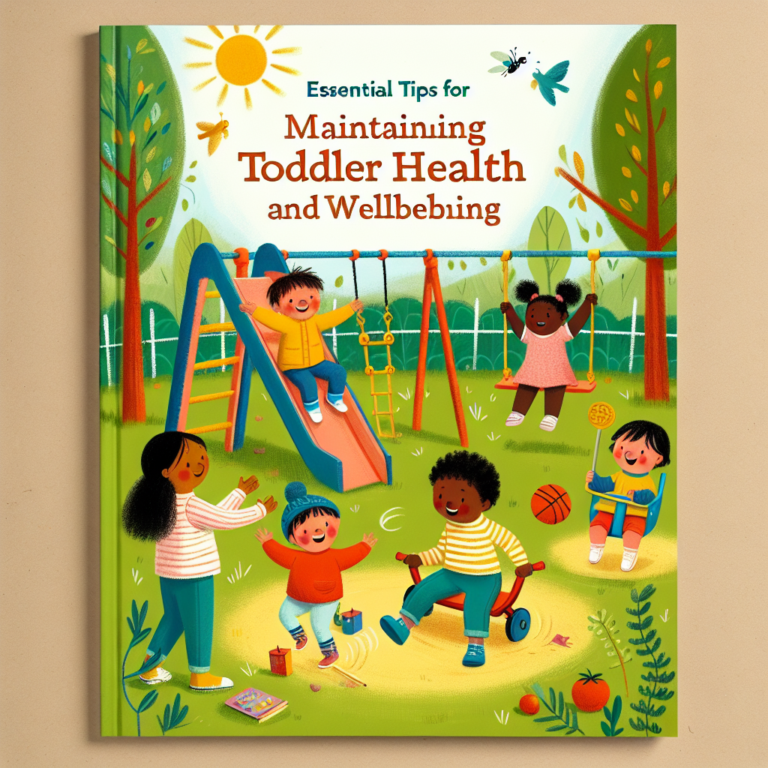In the journey of parenthood, ensuring the health and wellbeing of a toddler is a paramount concern that influences a child’s growth and development. As parents and caregivers navigate the myriad challenges and joys of raising a toddler, understanding the crucial aspects of toddler health becomes essential. This article delves into effective strategies and insights for fostering the overall wellbeing of young children, highlighting the significance of nurturing both their physical and emotional health. From practical tips to maintain toddler health to innovative approaches for promoting emotional resilience, this comprehensive guide aims to equip parents with the knowledge needed to support their child’s thriving development during these formative years. Whether you’re a new parent or an experienced caregiver, join us as we explore the essential elements of toddler wellbeing, ensuring that every child enjoys a healthy, happy, and balanced early childhood.
1. “Essential Tips for Maintaining Toddler Health and Wellbeing”
Ensuring the health and wellbeing of your toddler is a top priority for any parent. During these formative years, establishing healthy habits can set the foundation for lifelong wellness. Here are some essential tips to maintain your toddler’s health and wellbeing.
1. **Balanced Nutrition**: A well-balanced diet is crucial for your toddler’s growth and development. Aim to provide a variety of fruits, vegetables, whole grains, and lean proteins. Toddlers need a diet rich in essential nutrients, including calcium, iron, and vitamins A and C. Limit processed foods and sugary snacks, which can lead to poor health outcomes.
2. **Regular Physical Activity**: Toddlers are naturally active, so encourage this behavior by providing plenty of opportunities for safe play. Physical activity is vital for developing motor skills, building strong bones and muscles, and promoting a healthy weight. Activities like running, jumping, and climbing not only support physical health but also improve mood and cognitive development.
3. **Adequate Sleep**: Sleep plays a critical role in your toddler’s health. Toddlers typically need 11 to 14 hours of sleep, including naps, each day. Establishing a consistent bedtime routine can help ensure your toddler gets the rest they need. Adequate sleep is linked to better behavior, enhanced learning, and overall wellbeing.
4. **Hygiene Habits**: Teaching good hygiene practices early on helps prevent the spread of germs and illnesses. Encourage your toddler to wash their hands frequently, especially before meals and after using the bathroom. Regular bath times and dental care are also important components of maintaining your toddler’s health.
5. **Emotional Wellbeing**: Mental and emotional health is just as important as physical health. Spend quality time with your toddler, offering love, attention, and support. Encourage open communication, and be attentive to their emotional needs. Social interactions with peers can also promote emotional and social development.
6. **Routine Health Checkups**: Regular visits to a pediatrician are essential for monitoring your toddler’s growth and development. These checkups provide opportunities for vaccinations and screenings, ensuring your toddler stays healthy. Don’t hesitate to discuss any concerns you have about your toddler’s health with your healthcare provider.
 Also Read:
Optimizing Toddler Health and Wellbeing: Essential Nutrit...
Also Read:
Optimizing Toddler Health and Wellbeing: Essential Nutrit...
By focusing on these key areas, you can help support your toddler’s health and wellbeing, paving the way for a healthy and happy childhood.
2. “Promoting Physical and Emotional Wellbeing in Toddlers”
Promoting physical and emotional wellbeing in toddlers is crucial for their overall development and lays the foundation for a healthy lifestyle. At this tender age, toddlers are experiencing rapid growth and development, which makes it essential to nurture both their physical and emotional health.
To foster physical wellbeing, it’s important to encourage regular physical activity. Toddlers naturally have an abundance of energy, and engaging them in activities such as running, jumping, and climbing can help develop their motor skills. Simple games like playing catch or dancing to music can be both fun and beneficial. Outdoor play is particularly advantageous, as it not only strengthens their muscles but also exposes them to fresh air and sunlight, which is vital for vitamin D synthesis.
Nutrition plays an equally significant role in a toddler’s physical health. A balanced diet rich in fruits, vegetables, whole grains, and lean proteins is essential. Ensuring that toddlers receive adequate water intake is also important for their hydration and overall health. Establishing healthy eating habits early on can help prevent childhood obesity and instill lifelong positive dietary practices.
Emotional wellbeing is equally important in the formative toddler years. Building a secure and loving environment is key. This can be achieved through consistent routines that provide a sense of stability. Positive reinforcement, encouragement, and attention help toddlers develop self-esteem and confidence. It’s also essential to teach toddlers how to express their emotions appropriately. Encouraging them to talk about their feelings and validating their emotions can help them develop emotional intelligence.
Social interactions are another critical component of emotional wellbeing. Playdates, group activities, or attending toddler classes can help them develop social skills and learn to interact with peers. These experiences teach toddlers how to share, cooperate, and resolve conflicts, which are vital skills for emotional development.
In summary, promoting physical and emotional wellbeing in toddlers involves a holistic approach that includes regular physical activity, proper nutrition, a nurturing environment, and opportunities for social interaction. By focusing on these areas, parents and caregivers can support the healthy growth and development of their toddlers, setting them on a path to a balanced and fulfilling life.
